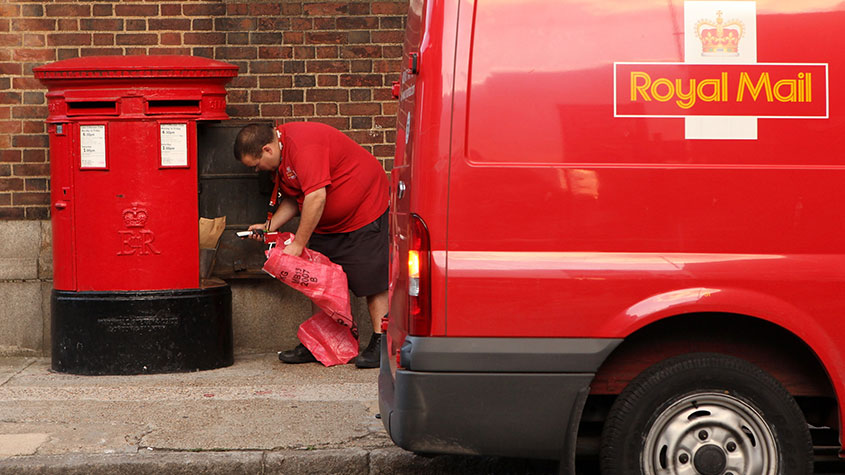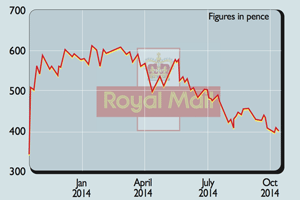Dying business, striking staff – should you really buy Royal Mail?
There are plenty of reasons to avoid buying shares in Royal Mail. But despite all its problems, could it still be worth a punt?

Get the latest financial news, insights and expert analysis from our award-winning MoneyWeek team, to help you understand what really matters when it comes to your finances.
You are now subscribed
Your newsletter sign-up was successful
Want to add more newsletters?

Twice daily
MoneyWeek
Get the latest financial news, insights and expert analysis from our award-winning MoneyWeek team, to help you understand what really matters when it comes to your finances.

Four times a week
Look After My Bills
Sign up to our free money-saving newsletter, filled with the latest news and expert advice to help you find the best tips and deals for managing your bills. Start saving today!

Privatisation is back in fashion.
The government will want to sell its stake in Lloyds Bank before too long. But before then, we have a Royal Mail share sale that is almost ready to go.
Many private investors made good money from the last big privatisation boom in the 80s. So does it make sense to play the same game almost 30 years later?
MoneyWeek
Subscribe to MoneyWeek today and get your first six magazine issues absolutely FREE

Sign up to Money Morning
Don't miss the latest investment and personal finances news, market analysis, plus money-saving tips with our free twice-daily newsletter
Don't miss the latest investment and personal finances news, market analysis, plus money-saving tips with our free twice-daily newsletter
In particular, should you buy shares in Royal Mail?
The reasons to avoid Royal Mail
The biggest minus point and it is a very big one is that Royal Mail's traditional business is in massive decline. The number of letters delivered by Royal Mail has slumped by 30% since 2006, with an 8% decline over the last year alone.
Granted, that decline is at least partially offset by Royal Mail's fast-growing parcels business. But there's plenty of competition in that market, and not all the players involved are prospering. For example, Rentokil Initial sold its courier business, City Link, earlier this year for just £1.
What's more, Royal Mail will continue to be constrained by the Universal Service Obligation (USO). In other words, it must carry on charging the same price for each letter, even if it is sent from Cornwall to an address in the Scottish Highlands.
Strike action in protest against the privatisation also looks likely. And that will only help Royal Mail's rivals in the parcels sector pick up new customers from the incumbent, just as it needs all the business it can get.
So we've got a company whose main business is in decline, whose workers are fomenting rebellion, which is handicapped by social obligations, and where the best hope of growth is in an already cut-throat sector of the market.
Doesn't sound too promising, does it?
Yet, in spite of these problems, I still reckon that Royal Mail will prove to be an attractive investment.
Why Royal Mail is worth a punt
And with an election looming, there's one thing the government wants more than anything out of the Royal Mail sell-off: to promote the feel-good factor' by helping the small investor make a quick buck from this new-wave privatisation.
So that means Royal Mail is likely to go at a reasonable price. We don't yet know what that will be, but City analysts reckon on an initial valuation somewhere between £2.5bn and £3bn.
Given that Royal Mail's pre-tax profits rose 60% to £324m last year, that kind of valuation doesn't look unreasonable.
It also looks like the company will pay a decent dividend. New shareholders will receive a total dividend of £133m next summer. That would be equivalent to £200m if the company had been listed on the stock market for a full year. Even at a £3bn valuation, the upper end of estimates, that's a 6.6% dividend yield.
It's reasonably well covered too. Royal Mail generated free cash of £334m last year, so it shouldn't have any problems paying out, as long as the parcels business can continue to grow and offset declining letter volumes.
And despite the strong competition in the sector, I think Royal Mail's parcels division can do just that. Parcels now account for more than half of the company's sales, and this is growing at 13% a year. There's also plenty of scope for further efficiency gains once extra investment in new machinery and the like is made.
That takes us back to one of the main points of privatising the service: enabling that extra investment. Just now, Royal Mail pays 8.6% interest on its debt to the government. That cost of capital should fall sharply once the company is in the private sector.
What's more, the management team seems capable, having already delivered an impressive turnaround. That free cash flow figure of £334m last year that I cited earlier is up from a £390m free cash outflow in 2009 (effectively a loss, in other words).
And there's no need to worry about looming pension deficits, as all those pension responsibilities have been transferred over to the government. That might bother you as a taxpayer, but as a potential Royal Mail shareholder, it's good news.
It's also worth remembering just how well some private investors did from privatisations back in the 80s. If you'd bought and held £1,350 worth of British Gas shares at privatisation, you'd now have shares worth £16,534 in all the successor companies, according to Hargreaves Lansdown. And that's excluding dividends!
If you're tempted to invest, we'll have more details on the technicalities in the next few days. But we do know that the government plans to sell shares within weeks' and that it will sell at least 41% of the company.
It should also be pretty easy to participate. If you already have a stockbroker, you'll probably be able to buy without paying a dealing charge. The government will also be selling shares directly via post or the web.
We'll be covering the story in next week's issue of MoneyWeek magazine if you're not already a subscriber, you can subscribe to MoneyWeek magazine.
Our recommended articles for today
Why I need more than 25% of my wealth in fast-growing shares
3D printing: the dawn of a new industrial revolution
Get the latest financial news, insights and expert analysis from our award-winning MoneyWeek team, to help you understand what really matters when it comes to your finances.
Ed has been a private investor since the mid-90s and has worked as a financial journalist since 2000. He's been employed by several investment websites including Citywire, breakingviews and The Motley Fool, where he was UK editor.
Ed mainly invests in technology shares, pharmaceuticals and smaller companies. He's also a big fan of investment trusts.
Away from work, Ed is a keen theatre goer and loves all things Canadian.
Follow Ed on Twitter
-
 Should you buy an active ETF?
Should you buy an active ETF?ETFs are often mischaracterised as passive products, but they can be a convenient way to add active management to your portfolio
-
 Power up your pension before 5 April – easy ways to save before the tax year end
Power up your pension before 5 April – easy ways to save before the tax year endWith the end of the tax year looming, pension savers currently have a window to review and maximise what’s going into their retirement funds – we look at how
-
 Royal Mail’s 7.2% dividend yield is now under threat
Royal Mail’s 7.2% dividend yield is now under threatTips Royal Mail's dividend yield is coming under pressure as costs rise and delivery volumes fall. Profits are under threat, and investors can't take anything for granted, says Rupert Hargreaves.
-
Share tips of the week
Features MoneyWeek’s comprehensive guide to the best of this week’s share tips from the rest of the UK's financial pages.
-
 If you’d invested in: Wizz Air and Royal Mail
If you’d invested in: Wizz Air and Royal MailFeatures Wizz Air is the largest low-cost airline in central and eastern Europe – and it is flying high.
-
Company in the news: Royal Mail
Features Phil Oakley explains what the dramatic collapse of competitor City Link means for Royal Mail.
-
 Shares in focus: Can Royal Mail deliver profits?
Shares in focus: Can Royal Mail deliver profits?Features Pessimism surrounds the mail service’s prospects. Is it overblown, and should you buy the shares? Phil Oakley investigates.
-
Company in the news: Royal Mail Group
Features Shares in Royal Mail were a steal at their flotation price, but have now fallen back as the company has run into a few problems. Phil Oakley asks if it's time to buy.
-
Company in the news: Royal Mail Group
Features Royal Mail shares looked tempting before the float. But, now the shares have risen in price, is it too late to buy? Phil Oakley reports.
-
Was the Royal Mail sold off too cheaply?
Features Was the British public betrayed by an overzealous government in the Royal Mail sell-off? Emily Hohler reports.
